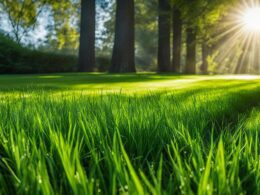Are you puzzled by the mysterious holes appearing in your yard? If you find yourself constantly dealing with unsightly craters, it’s time to identify the culprits and take action. Understanding the creatures behind the digging can help you manage them effectively and protect your yard.
From skunks to raccoons, moles to groundhogs, various animals could be responsible for the holes in your yard. They dig for different reasons, such as searching for food, seeking shelter, or creating nests. By identifying the type of animal causing the damage, you can implement targeted strategies to stop them in their tracks.
In this article, we’ll dive into the world of yard diggers, exploring the reasons behind their behavior, the types of animals that dig holes, the damage they can cause, and how to identify them. We’ll also provide tips on how to prevent further digging and maintain a healthy yard.
Understanding Why Animals Dig Holes in Yards
Animals dig holes in yards for different reasons. Some dig to find food, such as burrowing rodents like moles and gophers searching for worms, grubs, insects, and vegetation. Signs of food-seeking behavior include grub infestations or piles of granular pellets from earthworms. Other animals dig holes to create shelter, like skunks that tunnel through moist, loose dirt to build burrows. Nesting behavior can also be a motivator for digging, with animals like ground squirrels, moles, and voles building extensive underground tunnels that contain nests for their young.
To understand why animals dig holes in your yard, it’s essential to consider their natural behaviors and instincts. Some animals are driven by food-seeking behavior, as they dig to uncover a tasty meal beneath the surface. Burrowing rodents like moles and gophers use their sharp claws to dig tunnels, searching for earthworms, grubs, insects, and vegetation. If you notice grub infestations or piles of granular pellets from earthworms, it’s a sign that these animals have been actively seeking food in your yard.
Shelter-seeking behavior is another reason why animals dig holes. Skunks, for example, tunnel through moist, loose dirt to create burrows where they can seek refuge from predators and harsh weather conditions. These burrows also serve as a safe space for skunks to raise their young. If you’ve noticed loose dirt or small holes scattered throughout your yard, it may be an indication of skunks searching for shelter.
Nesting behavior can also motivate animals to dig holes in your yard. Ground squirrels, moles, and voles are known for their extensive underground tunnel systems, which provide suitable nesting environments for their offspring. These tunnels can be complex, with multiple chambers and entrances, ensuring the safety and comfort of their young. If you’ve observed long, winding tunnels or mounds of soil in your yard, it’s likely that these animals have been nesting underground.
Types of Animals that Dig Holes in Yards
There are various types of animals that dig holes in yards, and by examining the size and characteristics of these holes, you can identify which animals may be responsible. Smaller holes, ranging from the size of a quarter to a softball, are often created by animals such as earthworms, cicada killer wasps, voles, pocket gophers, eastern chipmunks, and ground squirrels. On the other hand, larger holes, bigger than softballs, are typically made by animals like moles, Norway rats, skunks, raccoons, groundhogs, and even snakes.
By paying attention to the size and appearance of the holes in your yard, you can start narrowing down the potential culprits. Smaller holes are usually indicative of smaller animals, whereas larger holes suggest the presence of bigger creatures. This initial identification can help you adopt appropriate strategies to manage and prevent further digging in your yard.
Identifying the types of animals digging holes in your yard is essential to understanding how to address the issue effectively. Armed with this knowledge, you can move on to the next section and learn about the damage that these digging animals can cause to your yard and how to deal with them.
How Digging Animals Damage Yards
Digging animals can cause significant damage to yards, leading to a range of issues that need to be addressed. Their extensive networks of tunnels and burrows can result in soil instability, erosion, and shifting, which can have detrimental effects on the stability of buildings and the overall landscape. The continuous digging and burrowing activities of animals like raccoons, gophers, and voles can cause damage to grass, tearing it up or creating unsightly runways and dirt mounds. Additionally, digging animals pose a threat to flower and vegetable gardens, often targeting young vegetation and causing considerable damage.
Soil instability and erosion caused by digging animals can lead to a variety of problems in your yard. As these animals create their intricate underground habitats, the soil becomes less compact and stable. This can result in sinkholes, uneven ground surfaces, and potential damage to underground utilities. Furthermore, the continuous burrowing and tunneling activities can disrupt the natural distribution of moisture in the soil, leading to water runoff, poor drainage, and increased erosion. Over time, the cumulative effects of soil instability and erosion caused by digging animals can be costly to repair and restore.
The damage to grass caused by digging animals can be particularly frustrating for homeowners. Animals like raccoons and gophers are known to tear up patches of grass, leaving unsightly bare areas in your yard. They may also create runways or tunnel entrances that further compromise the integrity of your lawn. In addition to the visual damage, these disturbances can make it difficult to maintain a healthy and lush lawn, requiring extra efforts in reseeding and reestablishing the grass.
Garden enthusiasts also face challenges in protecting their precious flower and vegetable gardens from the destructive behaviors of digging animals. These animals often target new and tender vegetation, uprooting plants and consuming the fruits of your labor. The damage caused by digging animals can significantly impact the success and growth of your garden, resulting in frustration and disappointment.
It is crucial to understand the potential damage caused by digging animals in order to effectively address the issue and protect your yard. By implementing appropriate measures, such as identifying and deterring the specific animals, reinforcing the stability of the soil, and implementing protective measures for your grass and garden, you can reclaim your yard from the damage caused by these relentless diggers.
How to Identify Digging Animals in Your Yard
To identify the specific animal digging holes in your yard, there are several signs to look out for. One helpful clue is animal tracks. For example, skunks leave distinctive five-toed claw tracks, while opossums leave hand-shaped tracks. By examining these tracks, you can narrow down the potential suspects.
Another indicator is the presence of burrows or nests. Groundhogs, known for their medium-sized burrows, are one example. Moles, on the other hand, create volcano-shaped mounds as they dig their tunnels. These physical signs can provide valuable insight into which animal may be responsible for the damage in your yard.
Track Example:
By observing these signs, along with additional characteristics and behaviors of the animals, you can make an informed determination and take appropriate action to address the issue.
How to Stop Animals from Digging Holes in Your Yard
If you’re tired of animals digging holes in your yard, there are several effective strategies to prevent them from causing further damage. By implementing these methods, you can safeguard your yard and maintain its pristine condition.
One way to deter animals from digging in your yard is to modify their habitat. Remove potential food sources, such as fallen fruits or bird feeders, to make your yard less attractive to wildlife. Eliminate water sources, like leaky faucets or standing water, as animals are often drawn to moist areas. Additionally, trim back vegetation and seal off any potential nesting sites to discourage animals from seeking shelter in your yard.
Physical barriers:
Installing physical barriers can be highly effective in preventing animals from digging in your yard. Fences can keep larger animals, such as raccoons or groundhogs, out of your yard. For smaller animals like moles or voles, underground fences made of mesh or hardware cloth can be placed beneath the ground to prevent them from burrowing into your yard.
Natural deterrents:
Using natural deterrents can also help repel animals from your yard. Try spreading substances like castor oil, cayenne pepper, coffee grounds, garlic powder, or mint around the areas where animals are prone to dig. These strong scents can deter animals and make your yard less appealing to them.
Chemical repellents and motion-activated devices:
If natural deterrents prove ineffective, you can consider using chemical repellents or motion-activated devices. Chemical repellents, available in spray or granule form, can be applied to specific areas to discourage animals from digging. Motion-activated devices like lights, sprinklers, or sonic deterrents can startle animals when they approach your yard, effectively deterring them from causing any further damage.
Trapping and professional assistance:
Although it’s generally recommended to explore non-lethal methods, trapping can sometimes be necessary. If you choose to trap animals, ensure you do so humanely and in accordance with local regulations. It’s best to hire a professional wildlife removal service to safely and effectively handle the trapping and removal process.
By employing these preventive measures and taking proactive steps, you can successfully stop animals from digging holes in your yard, preserving its cleanliness and aesthetic appeal.
Maintaining a Healthy Yard to Prevent Digging
To prevent animals from digging holes in your yard, it is crucial to maintain a healthy and well-groomed outdoor space. A healthy yard not only enhances the aesthetic appeal of your property but also acts as a natural deterrent to burrowing animals. Follow these tips to maintain a yard that animals will think twice about:
1. Thick and Healthy Grass
Your first line of defense against digging animals is to have thick and healthy grass. A strong grass barrier makes it more challenging for burrowing critters to dig up your yard. Consider seeding your lawn with grass varieties like tall fescue or zoysiagrass, known for their deep root systems and dense growth. These grass types provide a solid foundation that animals will find difficult to penetrate.
2. Regular Grass Seeding and Maintenance
Regularly seed and maintain your grass to keep it thick and healthy. Fill in bare patches with grass seeds and provide proper care, including regular watering and mowing. Healthy grass not only discourages digging animals but also prevents soil erosion, helps protect against weed invasion, and improves overall yard health.
3. Yard Cleanliness
Keeping your yard clean and free of debris is essential for deterring wildlife from visiting your property. Ensure that you promptly dispose of trash, food scraps, and fallen fruits or vegetables. Regularly clear away fallen leaves, twigs, and other yard waste. A clean yard creates an environment that is less attractive to animals seeking food and shelter.
4. Secure Trash Receptacles
To further discourage animals from visiting your yard, use secure trash receptacles with tight-fitting lids. This prevents animals from accessing and scavenging through your garbage. Secure trash storage not only keeps your yard cleaner but also reduces the temptation for digging animals to explore your property.
By maintaining a healthy yard through proper grass seeding, regular maintenance, yard cleanliness, and secure trash storage, you can significantly reduce the likelihood of animals digging holes in your yard. Take the necessary steps to create a yard that animals will find less appealing, allowing you to enjoy a beautiful and undisturbed outdoor space.
Could Animals Digging Holes in the Yard Impact Fence Ownership Between Two Houses?
Animals digging holes in the yard could potentially impact fence ownership boundary disputes between two houses. If an animal continuously digs under the fence, it could cause damage that may lead to disagreements over who is responsible for repairs. It is important to address any issues promptly to avoid further complications.
Conclusion
In conclusion, discovering what animal is digging holes in your yard is the first step in effectively managing the issue. By identifying the specific type of animal and understanding their behavior, you can implement targeted strategies to stop them and protect your yard. It is important to consider habitat modification, physical barriers, natural and chemical deterrents, as well as maintaining a healthy yard to prevent further damage.
If the problem persists, seeking professional assistance from a pest control or wildlife removal service may be necessary. Their expertise and experience can help you solve the problem in a safe and effective manner. By taking these steps, you can reclaim your yard and prevent future digging.
Remember, yard diggers can be persistent, but with the right approach and proactive measures, you can successfully manage and control their activities. Don’t let them ruin your hard work and enjoyment of your outdoor space. Take action today to protect your yard and maintain its beauty and functionality.











